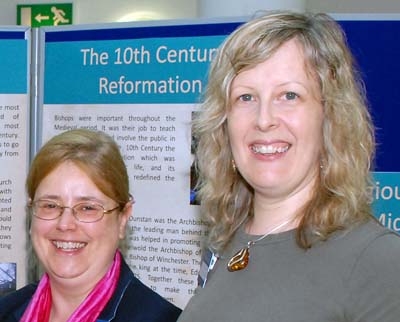Priests, of course, used to be married but that changed hundreds of years later after the foundation of Christianity. The justifications were that a priest should imitate Christ, who was celibate (unmarried), and still later there was an argument and decree that priests who were handling the sacraments had to also be unpolluted by sexual activity - chaste.
Obviously the first Pope, St. Peter, was neither. He was married, as were most of the Apostles. It wasn't until the Nicene Creed in 325 AD that it was even decided a priest could not marry after he was ordained. It didn't seem to matter - like pretending your cell phone has poor coverage to get out of a call, local churches who did not agree simply never received the notification. Surveys later revealed that practically no priest was celibate, much less chaste.(1) And The Council of Aix-la-Chapelle mentioned both abortion and infanticide as issues at some convents. Only in 1074 did Pope Gregory VII declare that priests must first pledge celibacy and make it stick; "priests [must] first escape from the clutches of their wives."
It sounds dogmatic but that was not the case; Gregory VII was a wildly popular choice of the clergy - though not all of them, since he also set out to eliminate 'simony' (selling indulgences) and his authority due to his popularity is why his decree on celibacy was controversial rather than simply ignored, as previous declarations had been. That controversy, and his advocacy of a western effort to rescue Byzantium from the Turks would become the First Crusade and the Crusades and their later romantic reframing through a prism of Christianity and Chivalry, are the foundation of a conference at University of Huddersfield on the idea of 'medieval masculinity' and celibacy in the clergy - their press release about the topic was curious enough to get me to write this piece.
Is medieval masculinity research a real thing? Data about medieval masculinity is, like research about cowboys from the American 'old west', long on cultural fable and short on facts and therefore hard to take seriously because it is based on literature. Are there conferences on the culture of cowboys? Not so much, it is instead romanticized, in reality they were just men doing a job, there was not much romanticism to them. Likewise, the average priest in 1074 did not know they were part of a chivalry movement that was redefining masculinity - masculinity did not exist, it was simply men and women. There were so few knights because it was an indulgence of the wealthy, being born to the right family was already proof they were superior to other men. Knights were not instead created to be chivalrous, chivalry became another way for rich people to outdo other rich people, it was not a defining characteristic of masculinity.
Dr. Pat Cullum and Dr. Katherine Lewis organized the ‘Religious Men in the Middle Ages’ conference and it was attended by 50 delegates from 14 countries and they have formed a group to 'research' the lives and experiences of medieval religious men. What seems to be missing in their researching of masculinity? Data and, in their group anyway, men.

Dr. Pat Cullum and Dr. Katherine Lewis. Credit: University of Huddersfield.
To advocate the field they have gotten together with two other researchers, also female, Dr. Philippa Hoskin and Dr. Joanna Huntington of the University of Lincoln, to form a network named ‘The Bishop’s Eye’ which they hope will host future conferences on the topic. They also hope to attract new scholars into this field of medieval masculinity and University of Huddersfield is offering two full fee-waiver Ph.D. scholarships to suitable candidates. Who wouldn't want to Ph.D. in that? It has now replaced Military Science in my mind as the most useless - and therefore cool - thing to get a degree in, should I ever decide to slog through graduate education.
That's not to say the idea is new, clearly medieval masculinity was big in the 1800s, given the popularity of Sir Walter Scott, but this modern reframing by sociology (and, of course, feminism) is a recent phenomenon. In modern flavors of medieval masculinity, subjugating women was a key aspect. How was that derived? By framing ancient culture through a modern prism, essentially ascribing motivations there was no evidence anyone had.
Gender, of course, is a given. 'Masculinity' is a relative social construct. Okay, maybe, a barbarian warlord was masculine as we know it - he had to be able to kill people and animals better than other warlords - but that definition of masculine was created by movies and books and the only things 'feminine' about the females of barbarian tribes is cultural attribution we created (like that prehistoric women looked like Raquel Welch) - we know next to nothing about the actual culture of ancient tribes. In less warlike cultures the popular people grew the most food - does that make them masculine or feminine?
During the days of chivalry, women were adored - that is patronizing (or awesome) to modern women in the humanities - but they forget that men also had a lot of (in our minds) ridiculous rules about behavior. At the core of these hypotheses about masculinity and roles is the belief that there is no choice, we just have aspects of culture imposed on us by The Other - so the culture and not the people can be the focus of the study. If your field happens to be medieval studies you now can feel a kind of legitimacy in making claims about who those people were.

Gender roles were not as cut and dried as modern sociology wants us to believe. Credit: Shutterstock
If modern culture can't tell us anything at all about real people today - and it can't, since statistics framed as sociology tell us more 'feminine' fields like environmentalism hate women and pay them less than men while 'masculine' fields like engineering pay women better than anyone - how can ancient literature? There's no need to get into mumbo-jumbo about cultural matrices, that is all just window dressing to mask the fact that people are studying ancient literature to try and make a meaningful analysis of what they were like, even if it is not possible. How many television sit-coms today are 'real' representations of what society is like? If 10 television shows were all that existed 1,000 years from now, what could they learn about us?
They would learn: fat, funny guys have thin, hot wives; all children talk like adults; people teleported between two and no more than three locations; everyone was a cop or a doctor or a lawyer. Whole journals could be written dissecting why it was and invoking Foucault and philosophical jargon and it would be a field of research. It would also be completely wrong, because it lacks any way to make a theory. So it's fun to think about, but studying? Just not possible.
NOTE:
(1) I am reminded of a joke from my days as an army officer in Augusta, Georgia. If the name of the city is familiar, it's where they hold the Masters Tournament in golf. It's a terrific golfing town and the jokes are good too. Here is one involving both golf and religion (which are almost the same there) but I am paraphrasing for brevity;
A man gets an invite to hit the links at Augusta National and shanks a drive off into some weeds. While searching for his ball he sees a frog, which says, "I am the Augusta magic frog. Once a year I show up and grant a gift to a lucky player. So which would you rather have for the next year, amazing sex or an amazing golf game?"
The man replies, "The golf!" And for the next year, it really is amazing. He can do no wrong. He gets invited back to Augusta as part of the pro-am...but his first drive shanks badly and when he goes to get the ball he sees the same frog.
"Has it been a year already? I guess my time is up but I want to thank you for this. I never had so much fun in my whole life."
"You're welcome," replies the frog. "But I have a question. I gave you a choice of amazing sex or amazing golf and you took the golf. I never had anyone do that before. How often do you get sex?"
"About four times a year," the man says.
"And that is a lot?" asks the frog.
"Well, for a priest in a small town, that ain't bad..."





Comments